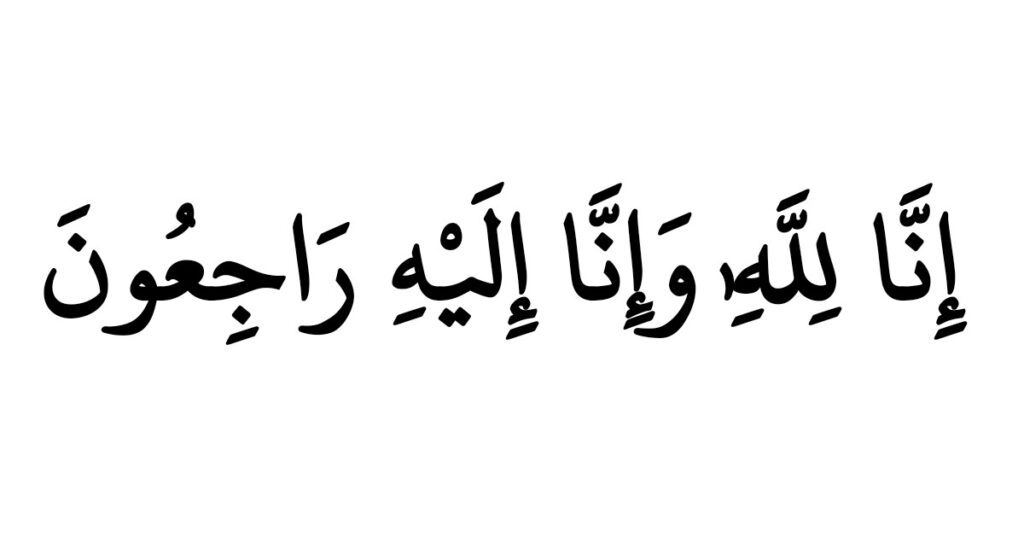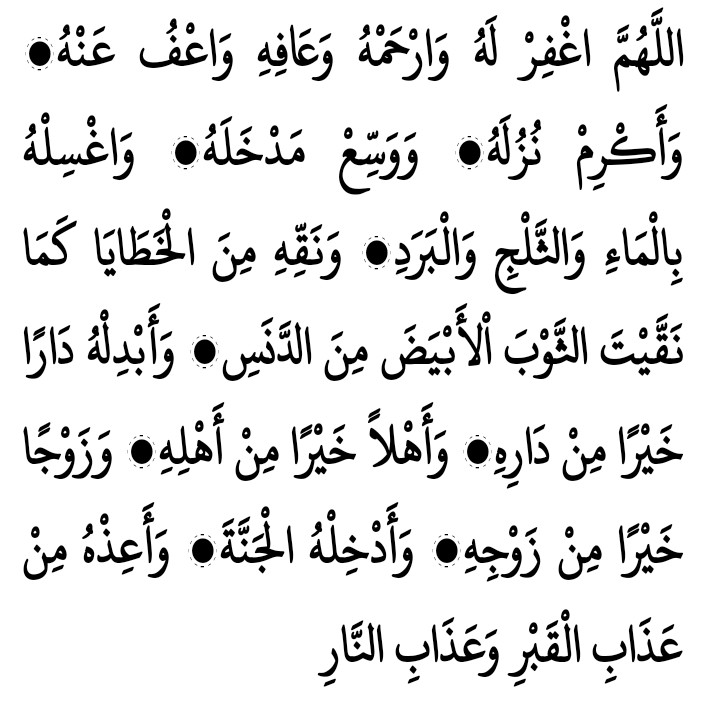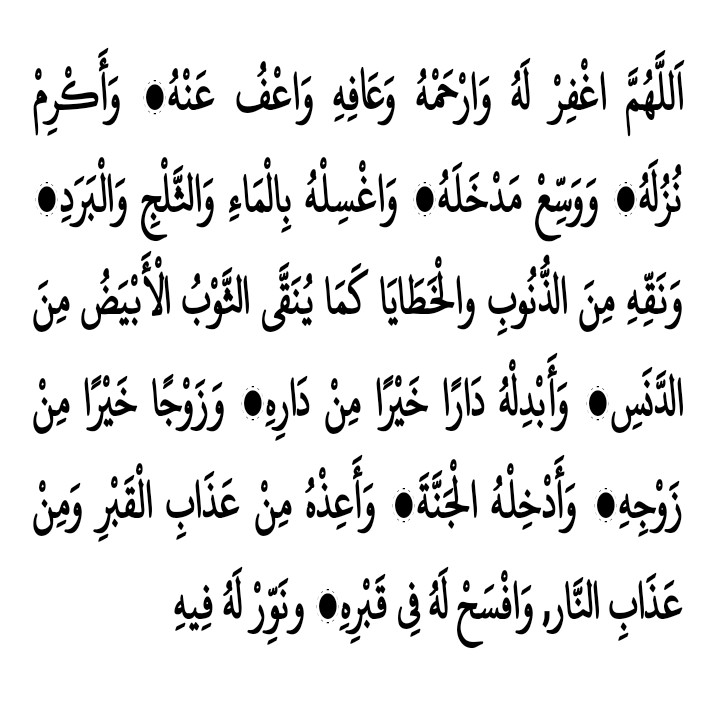When we hear news of someone who has died, we are obliged to pray for him. Mayyat Ki Dua will also provide goodness for the deceased.
From Abu Hurairah, Rasulullah SAW said:
“When a person dies, all his deeds will be cut off except for 3 things, namely almsgiving, useful knowledge, and pious children who pray for him.” – (HR Muslim).
Through this prayer, we hope that Allah SWT will forgive his sins and accept the good he has done. In addition, we pray that he will find a place by His side.
The following is a collection of prayers for the Mayyat Ki Dua will that can be read based on the Islamic religion?
Mayyat Ki Dua
Here are some important prayers for deceased:-
1. Prayer when Hearing of Someone’s Death
This Mayyat Ki Dua will quite familiar. The prayer is quite simple and can be said directly when hearing the news of death.
Prayer when experiencing a disaster or hearing the news of someone’s death is contained in Surah Al-Baqarah verse 156. A Muslim must of course be able to be patient and steadfast in facing tests from Him and say:

Common Dua for Mayyat
This Mayyat Ki Dua is read as a form of request for the door of goodness from Allah SWT. So that people who have died will receive love, forgiveness and a noble place by His side. Hopefully the deceased will also get a spacious grave.

Prayer when Visiting the Grave
Apart from prayers for the dead, also know the prayers when visiting graves. When on a pilgrimage, you can read this prayer to ask Allah SWT for forgiveness.

Also read: Ayat Ul Kursi
The Concept of Dua for Dead in Islam
In Islam, the concept of Mayyat Ki Dua holds deep significance and is rooted in the core beliefs and practices of the faith. Dua, which means supplication or prayer, is a way for Muslims to connect with Allah (God) and seek His blessings, guidance, and forgiveness. When it comes to Dua for the dead, there are several key aspects to consider:
1. Mercy and Compassion: Islamic teachings emphasize the mercy and compassion of Allah. Dua for the deceased is an expression of the belief that Allah’s mercy extends beyond this life. Muslims believe that through sincere supplications, they can ask Allah to bestow His mercy upon the departed souls, granting them peace and forgiveness.
2. Spiritual Support: Dua for the dead is a means of providing spiritual support to those who have passed away. It is believed that the souls of the deceased continue to exist in the afterlife, and the prayers of the living can benefit them by alleviating any suffering and by serving as a means to draw closer to Allah.
Also read: Dua for Safar
3. Earning Rewards: Offering Dua for the deceased is also a way for the living to earn rewards and blessings from Allah. When a person prays for someone who has passed away, they are engaging in a selfless act of kindness, and Islam teaches that such acts are rewarded in the Hereafter.
4. Etiquettes and Guidelines: Islam provides specific guidelines for making Mayyat Ki Dua. It’s encouraged to do so with sincerity, humility, and with the belief that Allah listens and responds to sincere supplications. There are recommended times and occasions for making Dua for the deceased, such as during the funeral prayer, on the anniversary of the death, and when visiting a graveyard.
5. Unity of the Ummah: Dua for the dead also highlights the sense of community and unity within the Muslim Ummah (community). When Muslims come together to offer prayers for a deceased person, it reinforces the sense of togetherness and shared values.
How to Make Dua for Dead
Making Dua for the deceased in Islam is a noble and compassionate act, and it should be done with sincerity and following certain etiquettes. Here’s a guide on how to make Dua for the dead:
1. Intention: Begin by setting a clear and sincere intention. Your Dua should be made with the genuine desire to seek Allah’s mercy for the deceased and to remember and honor them.
2. Choose a Time and Place: While you can make Dua for the dead at any time and in any place, it’s especially recommended to do so on specific occasions like during the funeral prayer (Janazah), on the anniversary of the death (especially if it’s an annual tradition), or when visiting a graveyard.
3. Raise Your Hands: When making Dua, it’s a common practice to raise your hands in a humble and supplicating manner, facing the direction of the Kaaba in Mecca if possible. This gesture symbolizes your humility and submission to Allah.
4. Begin with Praise: Start your Mayyat Ki Dua by praising Allah (Subhanahu wa ta’ala) and sending blessings upon the Prophet Muhammad (peace be upon him). For example, you can say, “Bismillah, Alhamdulillah, and Salat and Salam upon the Prophet (peace be upon him).”
5. Personalized Prayer: In your Dua, you can mention the name of the deceased person. For instance, “O Allah, have mercy upon [Name of the Deceased].” You can also add specific requests or attributes of the deceased that you’d like Allah to consider.
6. Seek Forgiveness: It’s common to include a request for forgiveness for the deceased. You might say, “O Allah, forgive [Name of the Deceased], and grant them a place in Jannah (Paradise).”
7. Be Sincere and Humble: Approach the Mayyat Ki Dua with sincerity, humility, and a sense of presence. Pour your heart out to Allah and ask for His mercy with a genuine spirit.
8. Use Quranic Verses and Duas: You can also incorporate Quranic verses and well-known supplications for the deceased in your Dua. An example is Surah Al-Fatiha (the opening Surah of the Quran), which is often recited for the dead.
9. Conclude with Praise: Wrap up your Dua by praising Allah and sending blessings upon the Prophet Muhammad (peace be upon him) once again. For example, you can say, “Ameen, Ya Rabb al-‘Alamin.”
10. Pray for All Deceased: It’s a good practice to include not only the specific deceased person you’re remembering but also all the deceased Muslims. You can conclude your Dua with a general prayer for all believers who have passed away.
11. Repeat as Needed: You can make Dua for the deceased as often as you wish, whether during daily prayers, special occasions, or whenever you feel compelled to remember and pray for them.
Remember that making Mayyat Ki Dua for the dead is a virtuous act of kindness and a way to seek Allah’s mercy for the departed. It’s a practice that provides solace to the living and a means of benefiting the souls of those who have passed away.
Conclusion
In conclusion, the Mayyat Ki Dua is a powerful and profound supplication that holds great significance in Islamic tradition. It serves as a means to seek forgiveness and mercy for the deceased, asking for their souls to find peace and eternal rest. This prayer is not only a source of solace for the grieving, but it also reminds us of the transient nature of life and the importance of seeking Allah’s guidance and forgiveness throughout our journey on this earth.
As we remember and pray for our departed loved ones, let us also reflect on our own actions and strive to lead a life that is pleasing to Allah. May this dua be a source of comfort and a reminder of our ultimate purpose – to seek closeness to the Divine and prepare for the Hereafter.
